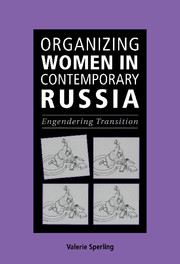Book contents
- Frontmatter
- Contents
- List of tables
- Acknowledgments
- Note on transliteration
- Map
- Introduction
- 1 Russian women's movement groups and activists
- 2 Analyzing social movements
- 3 Feminism, femininity, and sexism: socio-cultural opportunities and obstacles to women's movement organizing
- 4 “Democracy without women is not democracy!”: political opportunities and obstacles to women's movement organizing
- 5 “Unemployment has a woman's face…”: economic opportunities and obstacles to women's movement organizing
- 6 Remembrance of things past: the impact of political history on women's movement organizing
- 7 International influences on the Russian women's movement
- Conclusion
- Appendix
- Selected bibliography
- Index
Conclusion
Published online by Cambridge University Press: 22 September 2009
- Frontmatter
- Contents
- List of tables
- Acknowledgments
- Note on transliteration
- Map
- Introduction
- 1 Russian women's movement groups and activists
- 2 Analyzing social movements
- 3 Feminism, femininity, and sexism: socio-cultural opportunities and obstacles to women's movement organizing
- 4 “Democracy without women is not democracy!”: political opportunities and obstacles to women's movement organizing
- 5 “Unemployment has a woman's face…”: economic opportunities and obstacles to women's movement organizing
- 6 Remembrance of things past: the impact of political history on women's movement organizing
- 7 International influences on the Russian women's movement
- Conclusion
- Appendix
- Selected bibliography
- Index
Summary
By the mid-1990s, the activists who had created hundreds of Russian women's organizations were calling themselves a women's movement. But where were the demonstrations? Where were the coalitions of groups who worked on similar issues? Where were the leaflets, the national campaigns, the fundraisers, the outreach staff, the membership lists? The foregoing chapters suggested answers to these questions, by drawing attention to the activists' creation of a movement appropriate to their political culture and history, their economic conditions, their political opportunities, and their international context.
Summary of findings
There is no doubt that the political and economic transition period in Russia created conditions enabling the contemporary women's movement to emerge. Increasing political freedoms permitted women to speak out publicly against discrimination and sexist stereotyping; the unfolding economic crisis and its impact on women inspired activism in defense of women's rights in the workplace and the unemployment office. Clearly, the political opportunity structure had changed. Yet, it was not simply that the political transition (from a more to less repressive polity) had paved the way for feminist groups to speak out. The political transition had also allowed for increased exposure to Western ideas and international documents, which, in turn, provided a new standard for Russian state behavior where women's equal rights and opportunities were concerned. Armed with international agreements, activists demanded actions beyond mere hypocritical pronouncements of equality by state officials.
- Type
- Chapter
- Information
- Organizing Women in Contemporary RussiaEngendering Transition, pp. 257 - 272Publisher: Cambridge University PressPrint publication year: 1999



